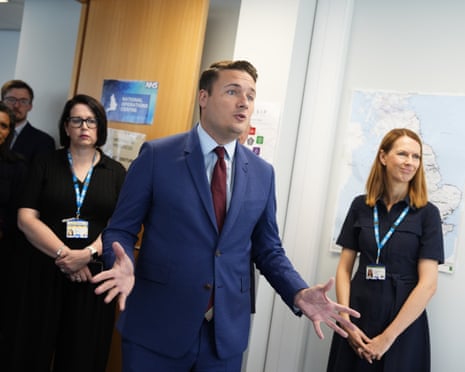Politics
Doctors Strike Launches Major Challenge for UK Health Secretary

The UK faces significant disruption as resident doctors prepare for a five-day strike beginning at 07:00 on Friday. This strike, which seeks to address long-standing grievances, poses a considerable challenge for Wes Streeting, the Secretary of State for Health and Social Care. With a backdrop of rising hospital waiting lists and a severe flu outbreak, the ramifications of this action will impact not only the healthcare system but also public sentiment towards the striking doctors.
Streeting’s response to the strike has been marked by a blend of wit and resolve. He recently addressed NHS Providers in Manchester, where he faced grim realities presented by healthcare managers during what NHS England’s CEO, Jim Mackey, described as “one of the toughest winters our staff have ever faced.” Hospitalizations from flu have surged, with figures showing an alarming 74% increase week-on-week last month. The latest statistics reveal that in October alone, 54,000 patients waited over 12 hours for a bed in emergency departments, reflecting nearly a 10% rise compared to the same month last year.
The current elective waiting list stands at an unprecedented 7.39 million. Analysis from the Health Foundation indicates that if current trends persist, the government is unlikely to meet its pledge to restore the 18-week elective care standard by the end of this parliamentary term. Over the course of the past two years, a total of 1.5 million appointments have been rescheduled due to the ongoing strikes.
The decision to strike comes after a decisive ballot, where 90% of doctors voted in favor of action with a turnout of 55%. This overwhelming support underscores the deep dissatisfaction among doctors regarding their working conditions. Many doctors express concerns about the structural issues within the NHS that leave them feeling detached from their hospitals, often subject to challenging rotations and inadequate working environments.
In response to these challenges, Streeting has proposed measures to address the bottlenecks in training placements. He aims to prioritize UK-trained doctors for training positions, a move that could alleviate some of the pressure. Currently, approximately 30,000 doctors compete for 10,000 training places, leaving many qualified individuals without opportunities.
Despite these initiatives, the issue of pay remains contentious. Streeting previously negotiated a 22.3% salary increase over two years for doctors, which translates to an average rise of 28.9% over three years. In contrast, other healthcare professionals, including nurses and midwives, have received offers around 3.6%. The doctors have since called for an additional 29% increase to restore their salaries to pre-2008 levels, although the debate over which inflation measure to use complicates negotiations.
Public sentiment has shifted since the doctors initially began their strikes under the previous government. Recent polls indicate that 51% of the public currently oppose the strikes, while 40% support them. This contrasts sharply with attitudes towards nurses, where 53% of respondents believe nurses should be permitted to strike.
The financial realities faced by the public may also influence perceptions. Starting salaries for resident doctors are around £38,000, potentially rising to £109,000 as fully trained consultants. Some may find it difficult to empathize with demands for higher pay amidst a general cost-of-living crisis affecting many sectors.
Conversations with healthcare professionals reveal a complex picture. One resident doctor, who chose to remain anonymous, shared that patient safety is a significant concern, leading many to refrain from striking, despite acknowledging the challenges faced by those in training posts. There is a recognition that hospitals are beginning to address working conditions, even as pay discussions continue to dominate the narrative.
As the strike approaches, the need for effective solutions to the training shortages becomes increasingly urgent. A recent report from the Higher Education Policy Institute suggests that training more generalist doctors and GPs could alleviate pressure on hospitals and reduce admissions. Such reforms will be challenging to implement in the current contentious atmosphere surrounding the strikes.
In summary, the upcoming strike by resident doctors represents a pivotal moment for the UK healthcare system and for Wes Streeting as he navigates the complexities of doctor grievances, public opinion, and the pressing need for substantial reform within the NHS.
-

 Health3 months ago
Health3 months agoNeurologist Warns Excessive Use of Supplements Can Harm Brain
-

 Health3 months ago
Health3 months agoFiona Phillips’ Husband Shares Heartfelt Update on Her Alzheimer’s Journey
-

 Science2 months ago
Science2 months agoBrian Cox Addresses Claims of Alien Probe in 3I/ATLAS Discovery
-

 Science2 months ago
Science2 months agoNASA Investigates Unusual Comet 3I/ATLAS; New Findings Emerge
-

 Science1 month ago
Science1 month agoScientists Examine 3I/ATLAS: Alien Artifact or Cosmic Oddity?
-

 Entertainment5 months ago
Entertainment5 months agoKerry Katona Discusses Future Baby Plans and Brian McFadden’s Wedding
-

 Science1 month ago
Science1 month agoNASA Investigates Speedy Object 3I/ATLAS, Sparking Speculation
-

 Entertainment4 months ago
Entertainment4 months agoEmmerdale Faces Tension as Dylan and April’s Lives Hang in the Balance
-

 World3 months ago
World3 months agoCole Palmer’s Cryptic Message to Kobbie Mainoo Following Loan Talks
-

 Science1 month ago
Science1 month agoNASA Scientists Explore Origins of 3I/ATLAS, a Fast-Moving Visitor
-

 Entertainment2 months ago
Entertainment2 months agoLewis Cope Addresses Accusations of Dance Training Advantage
-

 Entertainment4 months ago
Entertainment4 months agoMajor Cast Changes at Coronation Street: Exits and Returns in 2025









